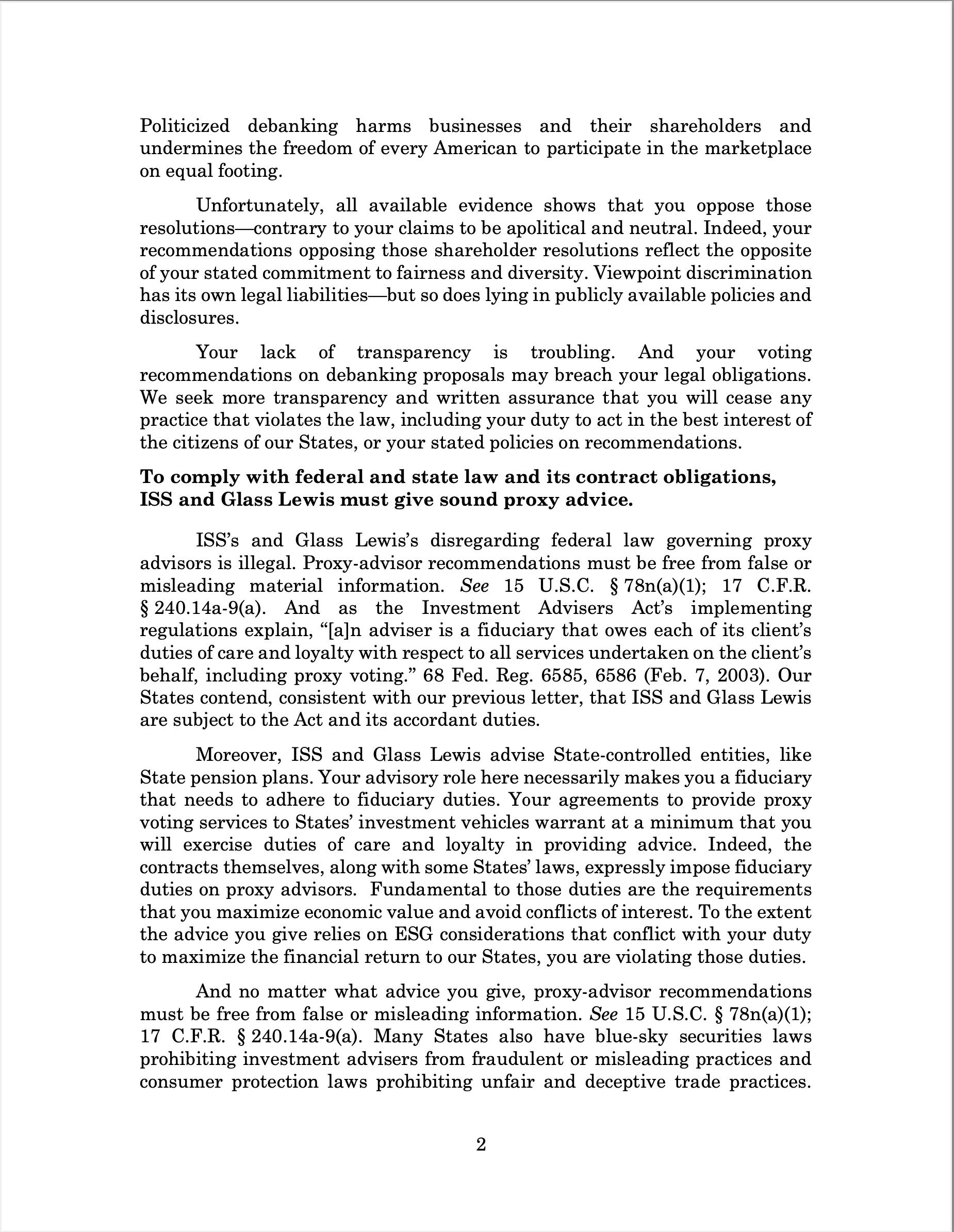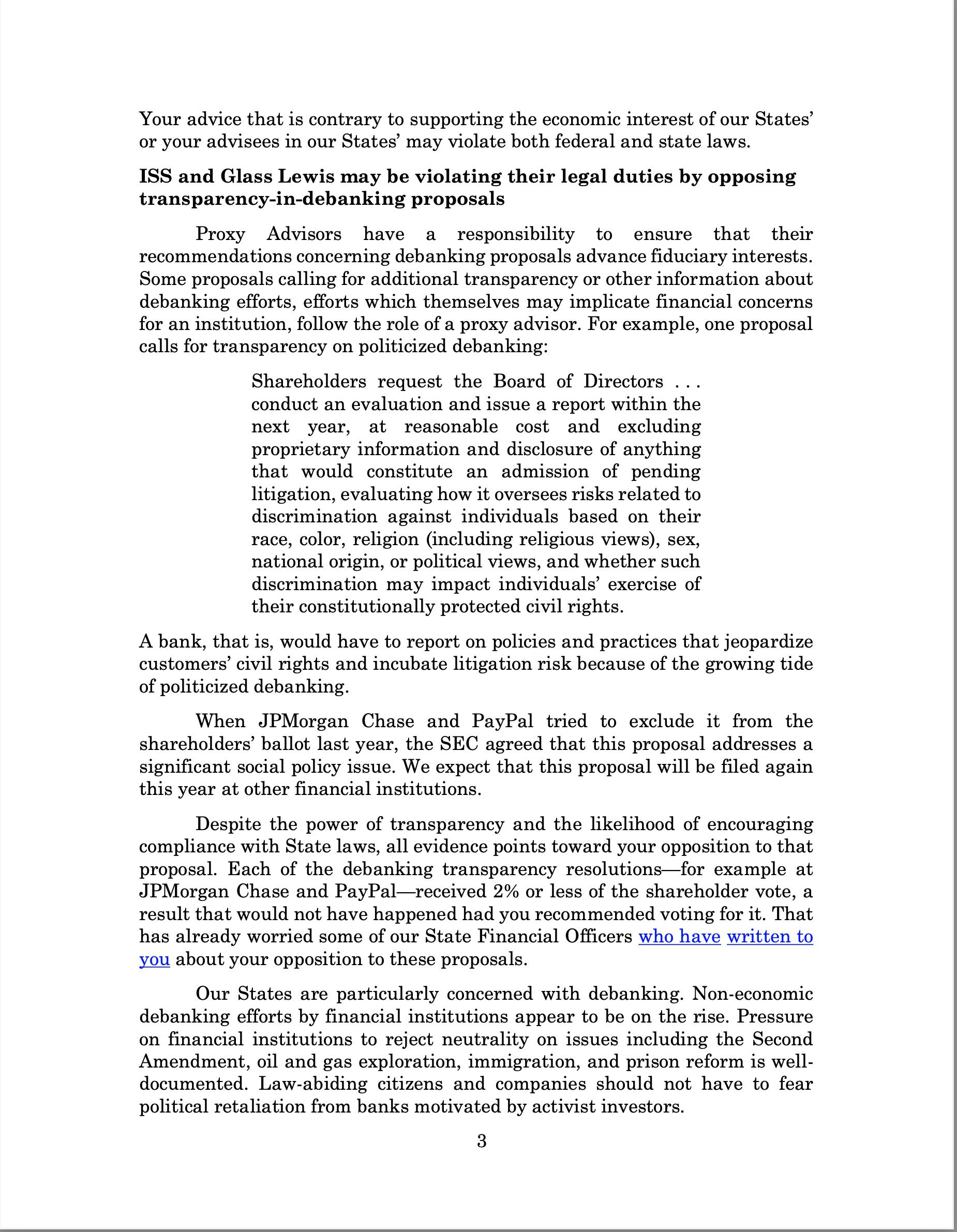The need for a Parallel Economy has never been more real than it is now…
Because Cancel Culture has never been as bad as it is right now!
And it’s one thing to get banned from Facebook — that’s bad enough, especially when you’re me with a community of 1.5 Million amazing people, and we all get deleted overnight. Poof! Gone!
That’s bad.
But it’s not AS bad as getting banned from Grocery stores!
Or getting banned from your Bank!
And that’s what’s coming next.
So I give incredible credit to Iowa’s fearless Attorney General who is leading the charge in a coalition of 22 state attorneys general to stop big banks from “debanking” conservatives.
Take a look”
Iowa Attorney General Brenna Bird leads coalition of 22 state attorneys general to stop debanking of conservatives! 👏👏
— DailyNoah.com (@DailyNoahNews) December 7, 2023
Here is the letter:







And here is a full transcription of the letter:
BRENNA BIRD ATTORNEY GENERAL
IOWA DEPARTMENT OF JUSTICE OFFICE OF THE ATTORNEY GENERAL
1305 E. WALNUT ST. DES MOINES, IA 50319 515-281-5164 www.iowaattorneygeneral.gov
November 29, 2023
Gary Retelny, President and CEO Institutional Shareholder Services, Inc. 1177 Avenue of the Americas, 14th Floor New York, New York 10036 USA
Kevin Cameron, Executive Chairman Glass, Lewis & Co. 255 California Street, Suite 1100 San Francisco, CA 94111
Dear Mr. Retelny and Mr. Cameron,
Your companies, International Shareholder Services, Inc., and Glass Lewis & Co., provide proxy voting advice to many businesses and investors who are citizens of our States as well as to our States’ investment vehicles.
That voting advice directly impacts how our Nation’s largest companies operate. Your companies’ proxy advice shapes the choices and activity of businesses and ultimately the United States’ and global economy. And that is why you must realize with such important power comes important responsibilities. Responsibilities to advise in a manner consistent with your legal duties. And a responsibility to embrace transparency so that regulators and customers easily understand the recommendations you make and why you make them. Although other problematic areas exist, one major point of this letter is to clearly state our view that recommendations opposing shareholder resolutions to increase transparency in debanking run contrary to your duties, responsibilities, and policies.
We have expressed deep concern that ISS and Glass Lewis are prioritizing certain environmental, social, and governance initiatives and that doing so violates your contractual and statutory duties to issue advice consistent with your responsibilities as a fiduciary.
And our criticism has not been limited to ISS and Glass Lewis. In February, 19 States called on JPMorgan Chase to account for its troubling pattern of apparent debanking. As part of the general market rejection of prioritizing ESG over fiduciary duties, last year shareholders sought to hold financial institutions accountable for denying or restricting service to clients based on their political or religious beliefs through the resolution process.
1
Politicized debanking harms businesses and their shareholders and undermines the freedom of every American to participate in the marketplace on equal footing.
Unfortunately, all available evidence shows that you oppose those resolutions—contrary to your claims to be apolitical and neutral. Indeed, your recommendations opposing those shareholder resolutions reflect the opposite of your stated commitment to fairness and diversity. Viewpoint discrimination has its own legal liabilities—but so does lying in publicly available policies and disclosures.
Your lack of transparency is troubling. And your voting recommendations on debanking proposals may breach your legal obligations. We seek more transparency and written assurance that you will cease any practice that violates the law, including your duty to act in the best interest of the citizens of our States, or your stated policies on recommendations.
To comply with federal and state law and its contract obligations, ISS and Glass Lewis must give sound proxy advice.
ISS’s and Glass Lewis’s disregarding federal law governing proxy advisors is illegal. Proxy-advisor recommendations must be free from false or misleading material information. See 15 U.S.C. § 78n(a)(1); 17 C.F.R. § 240.14a-9(a). And as the Investment Advisers Act’s implementing regulations explain, “[a]n adviser is a fiduciary that owes each of its clients duties of care and loyalty with respect to all services undertaken on the client’s behalf, including proxy voting.” 68 Fed. Reg. 6585, 6586 (Feb. 7, 2003). Our States contend, consistent with our previous letter, that ISS and Glass Lewis are subject to the Act and its accordant duties.
Moreover, ISS and Glass Lewis advise State-controlled entities, like State pension plans. Your advisory role here necessarily makes you a fiduciary that needs to adhere to fiduciary duties. Your agreements to provide proxy voting services to States’ investment vehicles warrant at a minimum that you will exercise duties of care and loyalty in providing advice. Indeed, the contracts themselves, along with some States’ laws, expressly impose fiduciary duties on proxy advisors. Fundamental to those duties are the requirements that you maximize economic value and avoid conflicts of interest. To the extent the advice you give relies on ESG considerations that conflict with your duty to maximize the financial return to our States, you are violating those duties.
And no matter what advice you give, proxy-advisor recommendations must be free from false or misleading information. See 15 U.S.C. § 78n(a)(1); 17 C.F.R. § 240.14a-9(a). Many States also have blue-sky securities laws prohibiting investment advisers from fraudulent or misleading practices and consumer protection laws prohibiting unfair and deceptive trade practices.
2
The problem goes back years…
Watch this testimony from a Chase customer:
The Daily Caller had more details:
Nearly two dozen state attorneys general signed onto a letter Wednesday demanding major firms that provide voting advice to corporate shareholders stop backing efforts to “debank” conservatives.
Republican Iowa Attorney General Brenna Bird led 22 other state attorneys general in sending a letter to the two companies that control 97% of the proxy advisory services market, Institutional Shareholder Service (ISS) and Glass Lewis, whose advice they say shapes “the choices and activity of businesses and ultimately the United States’ and global economy.” The letter warns them against opposing shareholder resolutions to hold financial institutions accountable for restricting services based on clients’ religious and political beliefs, noting that viewpoint discrimination comes with “legal liabilities.”
“They have advised big banks to keep quiet about why they’ve closed people’s bank accounts,” Bird told the Daily Caller News Foundation. “We’ve seen banks targeting accounts for Second Amendment groups, like the NRA, or religious groups, including Christian nonprofits.”
“They say they want transparency, but when it comes to the fact that some of the big banks are debanking conservatives or conservative causes, they don’t want that transparency,” Bird said.
Banks often use “reputational risk” or “hate speech” policies to target customers based on politics, the letter states. Bank of America canceled the accounts of Indigenous Advance, a Tennessee-based Christian nonprofit, earlier this year because it “no longer aligns with the bank’s risk tolerance,” according to the Alliance Defending Freedom.
The attorneys general are concerned ISS and Glass Lewis are opposing resolutions that seek to hold banks accountable for such instances of “politicized debanking.”
“These firms support a vast majority of left-of-center, pro-ESG shareholder proposals and effectively block proposals from conservative shareholders seeking to hold companies accountable for the anti-free speech and anti-religious behavior that ESG demands,” ADF Senior Vice President of Corporate Engagement Jeremy Tedesco told the DCNF.
More here from Project Veritas:
BREAKING @Project_Veritas: DEBANKING: Chase Bank Says “moral character” a Reason Why They Don't Do Business with "those types of people" Full #debanking video –> https://t.co/omrYL6FVkJ pic.twitter.com/EHUdCNYxQm
— James O'Keefe (@JamesOKeefeIII) April 16, 2019
And do you remember this?
Earlier today I learned that @kanyewest was officially kicked out of JP Morgan Chase bank. I was told there was no official reason given, but they sent this letter as well to confirm that he has until late November to find another place for the Yeezy empire to bank. pic.twitter.com/FUskokb6fP
— Candace Owens (@RealCandaceO) October 12, 2022
NATIONAL POLL: Are You Happy Melania Replaced Michelle As First Lady?
On a related note, if you are looking to work with a CONSERVATIVE payment processor, may I introduce you to my friend Pepe?
My Exclusive Interview With Pepe Deluxe!
This was a FUN one!
This morning I went live on my Rumble Channel (make sure you Follow me here: https://rumble.com/c/DailyTruthReport) with a new friend, Mr. Pepe Deluxe.
Don’t know him?
I bet you do.
He’s been a MAGA Patriot and warrior for the White Hats since 2016.
I bet you’ve seen and shared his memes….
Followed his channels…
Read his posts and comments.
And you probably didn’t even know who he was!
He’s one of the original “Pepe” accounts.
I met him recently at an event and we instantly hit it off.
But I’m not the only good judge of character out there….he’s also friends with Kari Lake:


Look, I gotta admit that’s cool and I’m a little jealous!
I wish I had pictures hanging out with Kari Lake!
One day I will….
Oh and Ed Henry has had him on his show:
But bottom line?
He’s just a good guy.
Normal guy, like you and me.
Salt of the earth.
And dude can talk to ANYBODY about ANYTHING!
So I told him we had to do a show together and that’s what we did this morning when we went live.
So.
Much.
Fun!
I let him tell his story about how Social Media nearly took his business under (very similar to my story)…
And how he’s devoted to helping save this country!
I always say that the Christian Conservatives are the people with all the creativity!
We are the ones creating…
We are the ones bringing new stuff into the world….
We are the ones running small businesses and offering goods and services to the world!
We are the ones making our communities better!
We build, we create, we add value!
What does the left do?
Steal, Kill and Destroy.
Wait a minute, where have I heard that before?
Ah yes, it’s John 10:10:
“The thief comes only to steal and kill and destroy; I have come that they may have life, and have it to the full.”
Christians are supposed to be the salt of the earth.
We are supposed to bring life…
We are supposed to build up, not tear down.
I try and do that here with this website.
I know so many of you reading this try to do that too.
And when he’s not making memes, Pepe Deluxe is a small business owner just like a lot of us.
He helps people with their credit card processing machines, and when I learned that it was another reason I was so excited to get him on my show.
Full disclosure: I love what he’s doing so much I’ve partnered up with him to get the word out about what he does.
Why do I care so much about credit card processing?
Sounds like of boring, right?
Far from it.
In fact, it’s what the Far Left has identified as a “choke point”.
It’s another HUGE way they can silence us and limit speech they don’t like.
How’s it work?
Simple….
Did you post something online “they” don’t like?
Are you selling a product “they” don’t like?
Are you a Christian Conservative?
Are you a patriot?
What if we just shut off your ability to process credit cards?
POOF – your business disappears overnight.
Exactly like how they deleted me off of Facebook in 2019.
It’s a serious problem and I was so excited when I found a patriot who can offer a FREE SPEECH solution!
That’s what Pepe does, and he’s been in this business since the 1990s.
He knows all the tips and tricks.
And he’s GOOD at it!
Oh, and he can probably save you some serious money each month if you run a small business and process credit cards.
BOOM!
As I always say, who loves ya baby?
I’m always bringing you solutions!
His company is called OneSourceSolutions and he explains the meaning behind that name in our interview.
If you are interested in seeing whether they can help you, go here (https://uspaygate.com) and tell them Noah sent you!
Or use promo code WLT.
And they’ll hook you up with some extra freebie stuff!
Ok, please enjoy this one….I know you will.
From Rumble:
As promised in the video, here are the links I mentioned:
OneSourceSolutions 👉 https://uspaygate.com/
Pepe on Telegram 👉 https://t.me/PepeDeluxed
Pepe on Twitter 👉 https://twitter.com/deluxe_pepe
Help us get Ben Garrison back on Twitter!
👇
https://wltreport.com/2023/07/13/exclusive-an-update-on-ben-garrison/
We all need to band together.
Even if you personally haven’t had your business shut down by a credit card processor, do you really want to keep giving your money to the Woke Big Corporations that hate you?
Let’s shift it.
Let’s support Patriots….who will support you right back and do all they can to keep your business OPEN and processing customers.
How’s that sound?
It starts with each of us.
By ourselves, we can’t do much….
But when we band together, we can give ’em the Bud Light treatment!




Join the conversation!
Please share your thoughts about this article below. We value your opinions, and would love to see you add to the discussion!